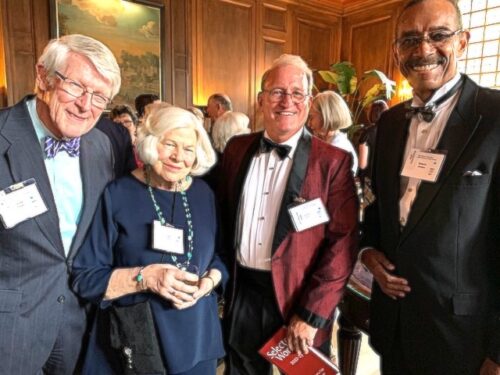By Minnie Marie Hayes

Frank Lackner pronounced the Chiago Literary Club’s sesquicentennial dinner, May 20 athe Racquet Club, to be the club’s 4,835 gathering.
The Chicago Literary Club raised a parting glass to a season-long celebration of its sesquicentennial year. Founded in 1874 on the ashes of two great fires, the CLC remains the third oldest club in the city. Frank Lackner, former president and 39-year member, declared the 150th birthday dinner, May 20th at the Racquet Club to be its 4,835th gathering.

Chicago Literary Club’s Sesquicentennial Chairman Jim Thompson and CLC President Robert Jordan welcome Richard Hunt and Mark Mobley from the Cincinnati Literary Club, founded 1849, making it the oldest literary
Guests from The Cincinnati Literary Club, oldest in the nation, (founded 1849) and The Indianapolis Club, (founded 1877) came to congratulate. Many toasts later, long-time member and professional pianist Stephen Thomas, bassist David Williams, and singer Liane Williams made music, finally leading a chorus of “Happy Birthday.” Then followed a surprise: Yolanda Deen’s glowing birthday cake topped by a lighted candle shaped into “150”.

“Stephen Thomas, bassist Eric & singer Liane Williams made music, CLC Sesquicentennial Chairman Jim Thompson wrote lyrics and sang and all finished the evening May 20 with a chorus

Eric Williams, bassist and Liane Williams, singer, made music with pianist Stephen Thomas. CLC Sesquicentennial Chairman Jim Thompson wrote lyrics and sang one song and all finished the evening with a chorus
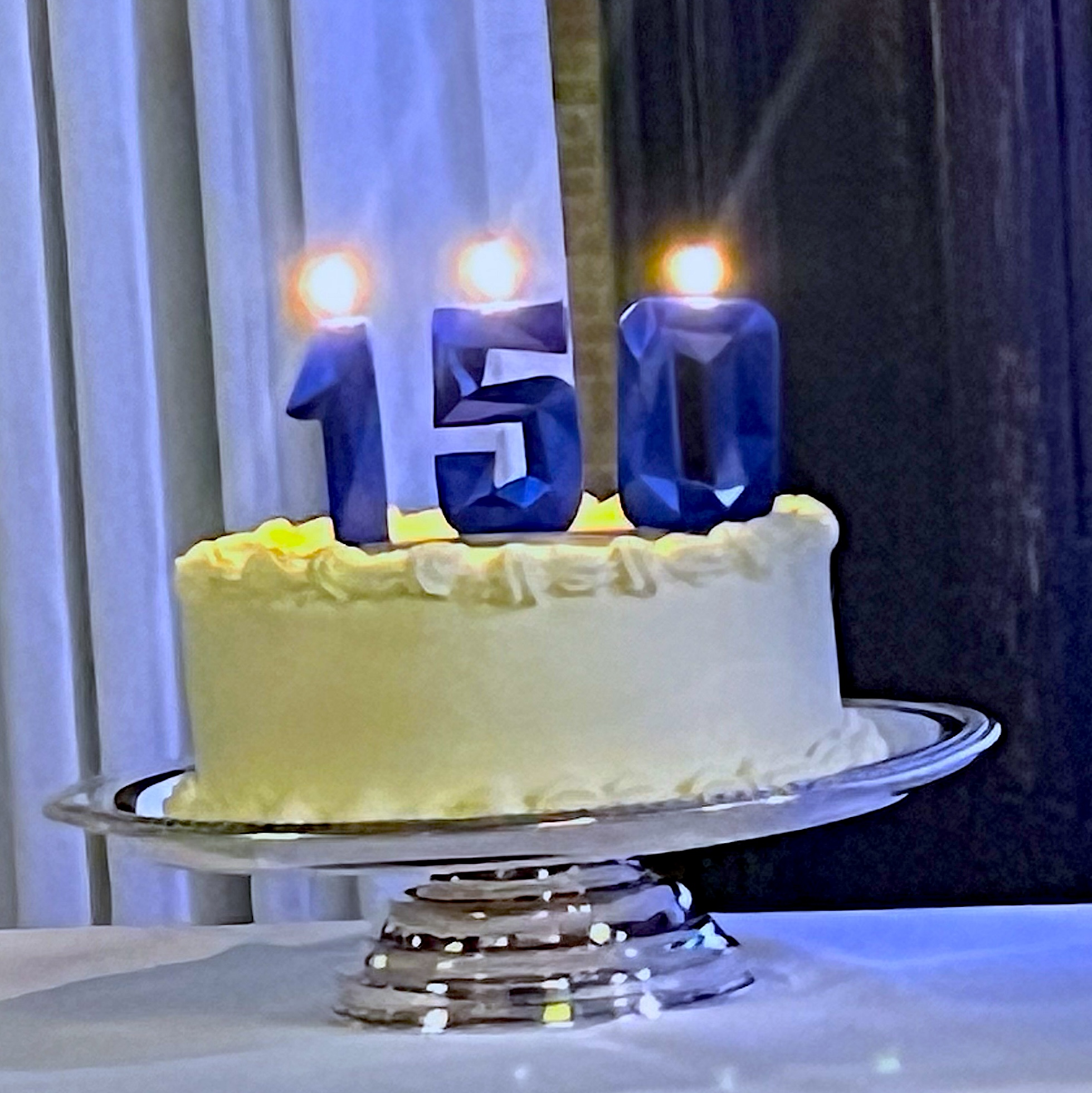
Yolanda Deen’s surprise birthday cake
The Chicago Literary Club has much to remember. An early member of the club, Daniel Burnham, stated famously, “Make no small plans.” And the city needed big ones. CLC members filled the ranks of civic leaders who built a new Chicago founded on ideas presented by members Daniel Burnham, Louis Sullivan, Lincoln’s son Robert Todd Lincoln, engineers. six generals and more. General Grant’s Chief of Staff at Shiloh, General Joseph Dana Webster, returned to help engineer raising Chicago 12 feet out of the mud and making possible the first sewage system. Member Nathan William MacChesney developed a muddy sandbar, now called Streeterville, to provide a downtown campus for his alma mater, Northwestern University School of Law.
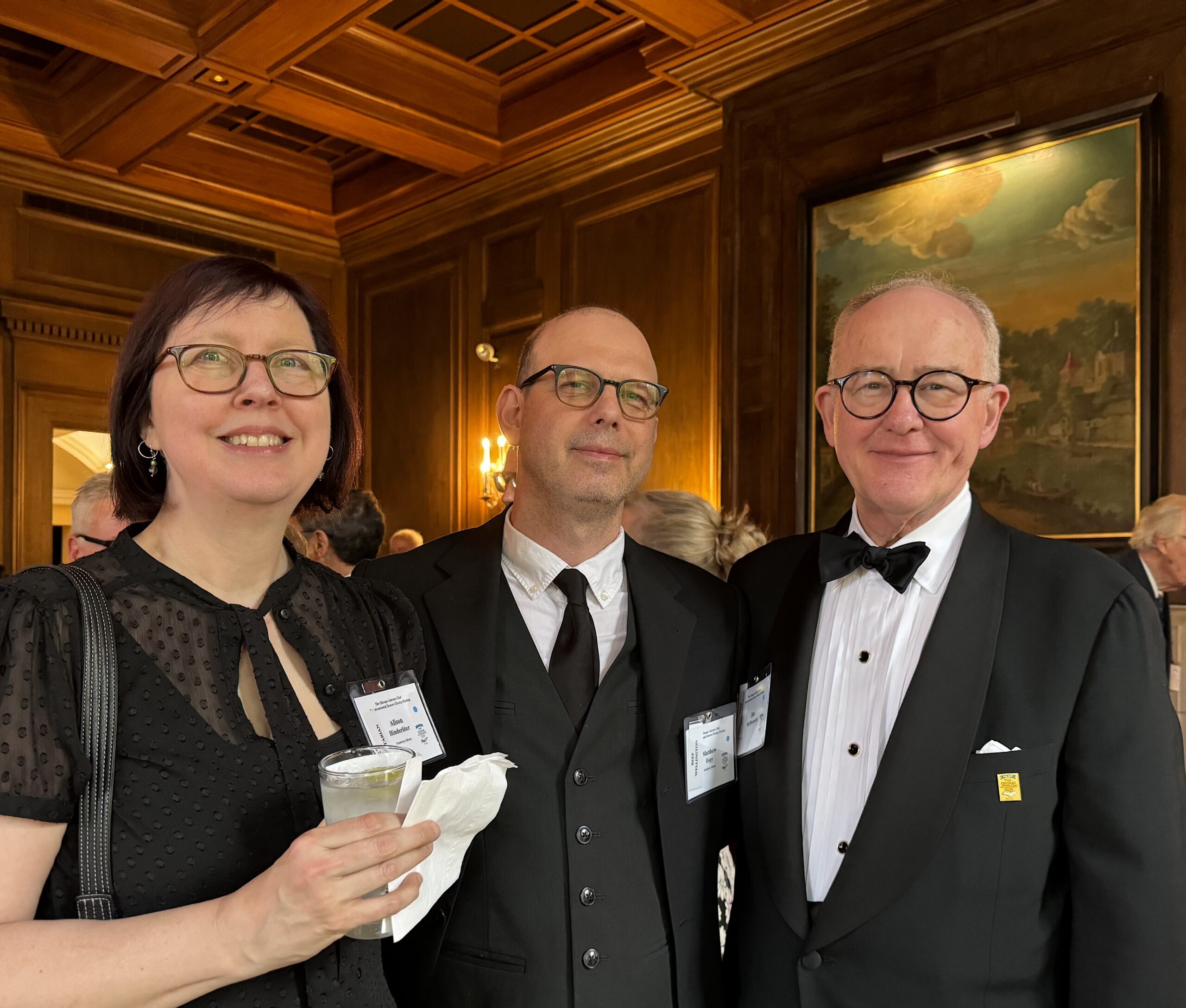
Alison Hinderliter, Lloyd Lewis Curator of Modern Manuscripts and Selector for Modern Music at Newberry Library, with husband Mathew Espy and CLC Historian Jim McMenamin |

CLC Sesquicentennial Chair Jim Thompson (left) with Judge Jamie Shapiro. xxxxxxxxxxxxxxxxxxxxx xxxxxxxxxxx xxxxxxxxxxxxxxxxxxxx x |

Antique 1907 postcard shows a rising Northwestern campus that Chicago Literary Club’s Nathan William MacChesney developed from landfill now called Streeterville, thereby creating a campus for his alma mater, Nor
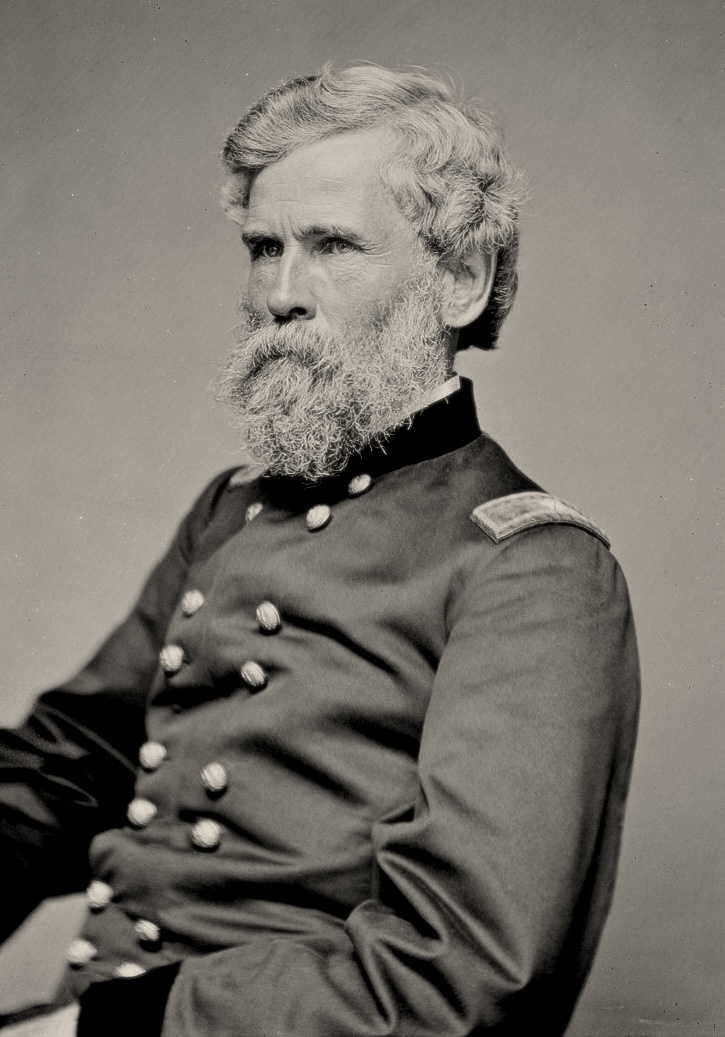
General Joseph Dana Webster, Grant’s Chief of Staff at Shiloh. CLC member Webster returned from the Civil War to help engineer raising Chicago 12-feet out of the mud.
As Frank Lackner put it at the Racquet Club dinner, “… It {1874} was a time of ferment and change; Chicago was a young city, and these were young men on the make. Chicago was climbing out of the ashes of the Great Fire of 1871 (and about to experience another later in 1874, almost as bad as the original). Jay Gould had just caused the Panic of 1873 by trying to corner the gold market, thereby bringing the economy to its knees. The final spike linking the country together with the transcontinental railroad was driven in 1869, not coincidentally connecting East with West through Chicago. Lake shipping crowded the port of Chicago, connecting the rail lines to the Erie Canal and New York, and provided further proof of Chicago’s status as an economic hub. Opportunity was everywhere. The fire created an open canvas.”

Chris Straus, CLC son and grandson. Straus family members have delivered a cumulative 70 CLC papers |
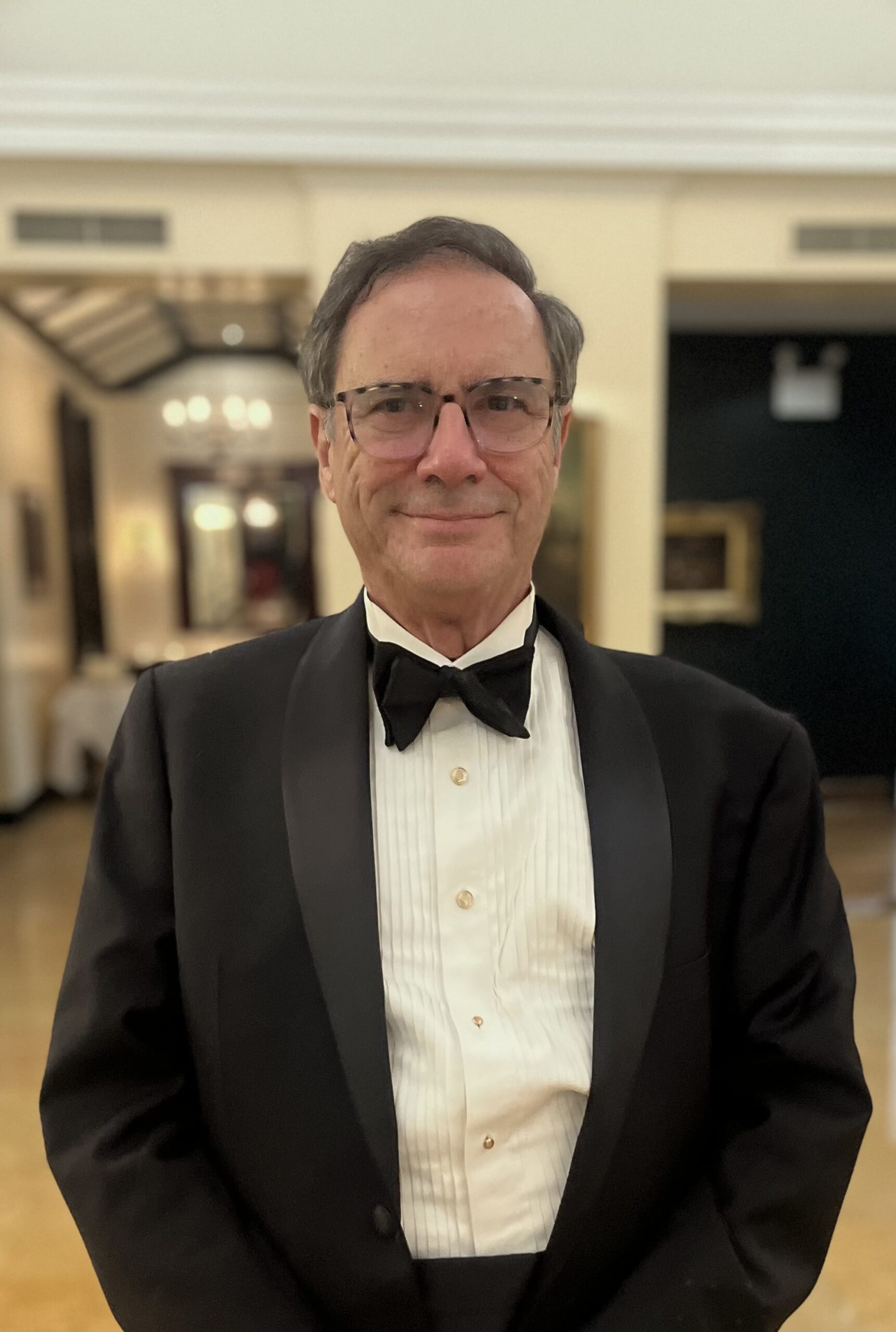
Howard Prossnitz, Incoming CLC President. |

133yr old Auditorium Theater within Roosevelt University building. Designed by-CLC member, architect Louis Sullivan.
The movement for women’s voting rights began. People awoke to a new world. Ambitious and hard-working Chicago merchants met to exchange ideas for creating a cultural life for the emerging city. They soon realized that Chicago needed a lot more. High-energy CLC members shared ideas and research for building a new city—fire-proof this time. Daniel Burnham presented a paper to the club, “The Lake Front” on December 14, 1896, and it morphed into the “1909 Plan of Chicago,” now archived at the Art Institute. Burnham’s plan shaped Chicago’s grid layout, park system and beautiful lakefront.

CLC Historian Jim McMenamin and CLC Vice-President Yolanda Deen welcome David and Kathleen Lips from The Indianapolis Literary Club, founded in 1877
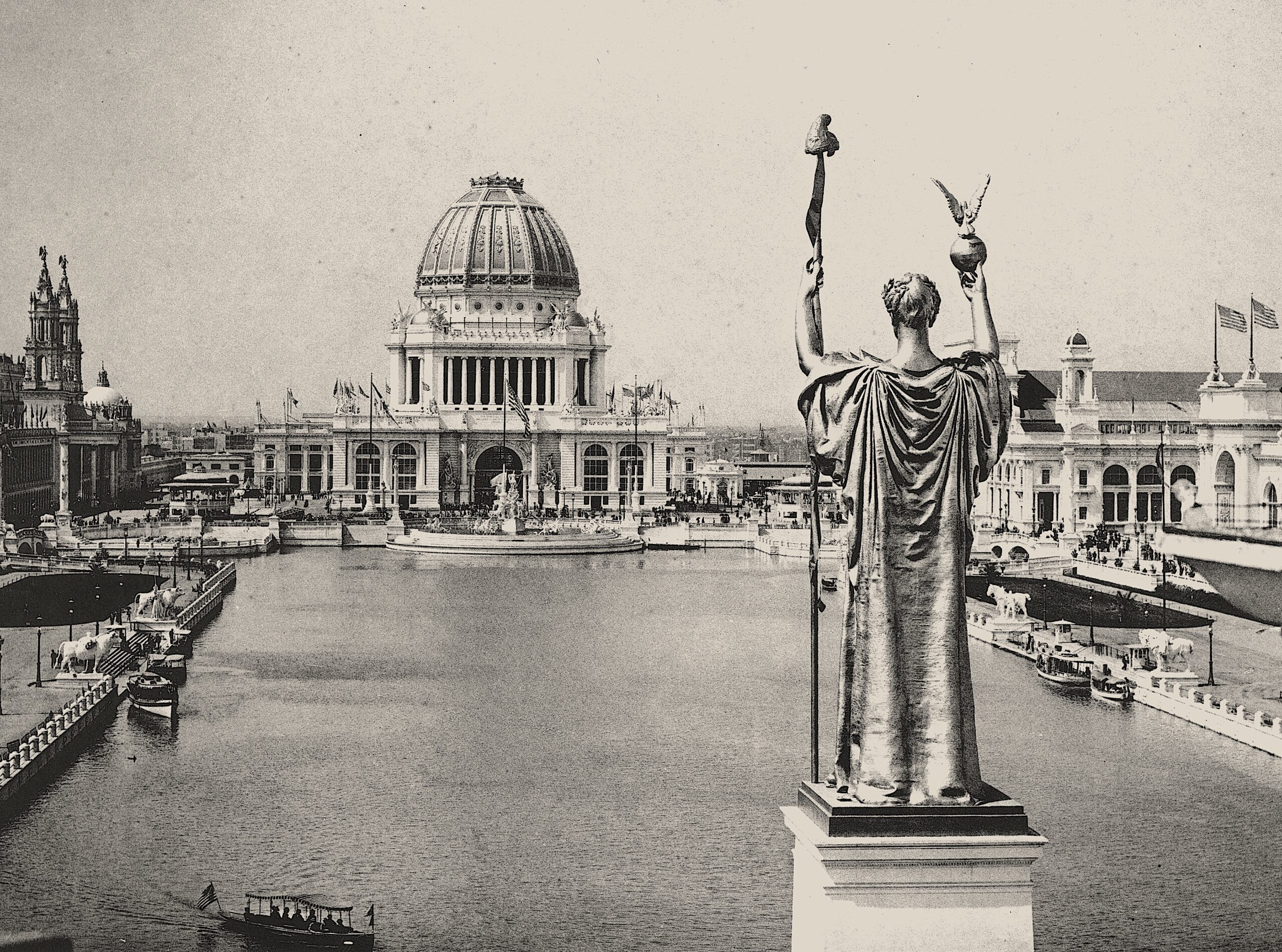
Chicago ‘White City’ at Columbian World’s Fair in Chicago 1893, designed by CLC member Daniel Burnham.
Original CLC members helped lead Chicago to become one of the fastest growing cities in the world. Plunked right in the middle of a still-young nation, right on the big toe of its watershed Great Lakes, Chicago’s population grew from 300,000 to 1 million people in 20 years. CLC members filled the ranks of those who defined ‘big shoulders’ for Carl Sandberg.
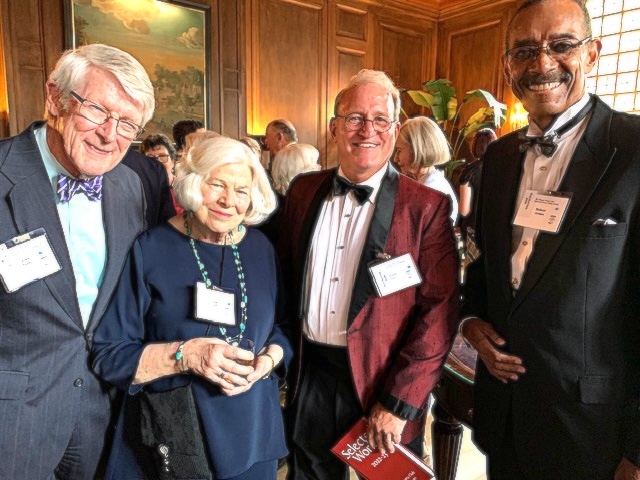
CLC Treasurer John Touhy and Ann Tuohy with Richard Hunt of the Cincinnati club, and CLC President Robert Jordan.
Down through the years, The Chicago Literary Club has included six generals, an ambassador to 1930s Germany, two senators and two Justices of the U.S. Supreme Court, one a Chief Justice. Much history to celebrate and the club made no small sesquicentennial plans. CLC banners flew around the city. Television stations interviewed legendary Emmy Award-winning WGN-TV anchor and CLC President Robert Jordan described the club today in a WGN-TV interview: “… a space for men and women who love reading, research and writing to come together and discuss topics of their own choosing.” It’s a club of good listeners. No politics, controversy, nor criticism from the audience permitted. None of that. Criticism-free turns out to be liberating, noted CLC’s Lainie Petersen, editor of Radio Ink magazine.
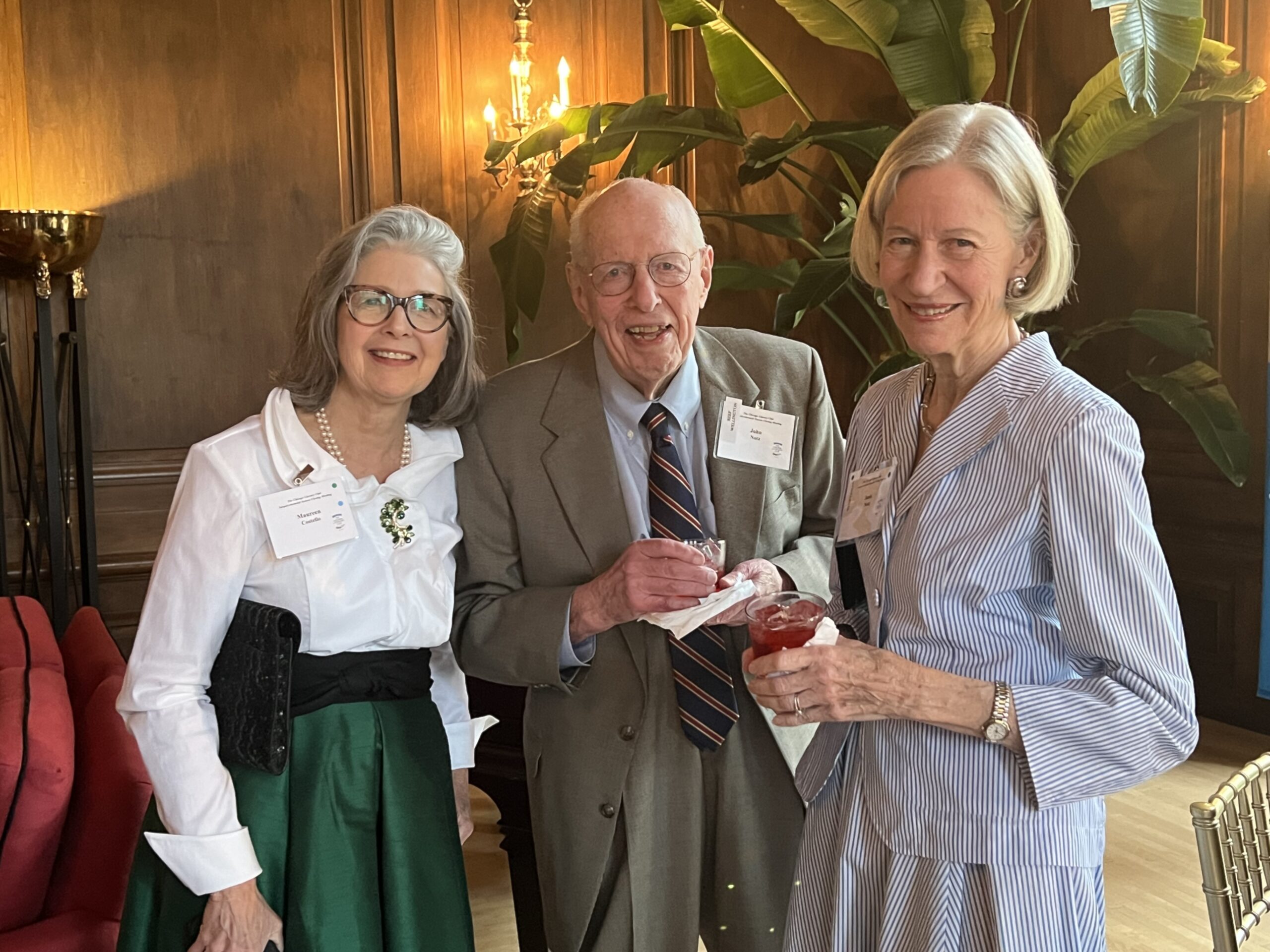
Maureen Costello, wife of CLC Historian Jim McMenamin, with John and Jan Notz.
Tireless CLC Historian Jim McMenamin made and presented weekly videos of historic Chicago and profiles of the early club members whose outsized contributions helped rebuild the city. CLC Sesquicentennial Chairman Jim Thompson orchestrated light-hearted weekly competitions (What date did (something) happen? Who said this? Best Haiku). Thompson presented winners with ‘literary swag’ and a bottle or two of the club’s specially commissioned, private-label, vintage brewed and aged (but not 150 years aged!) Sesquicentennial Cabernet Sauvignon.
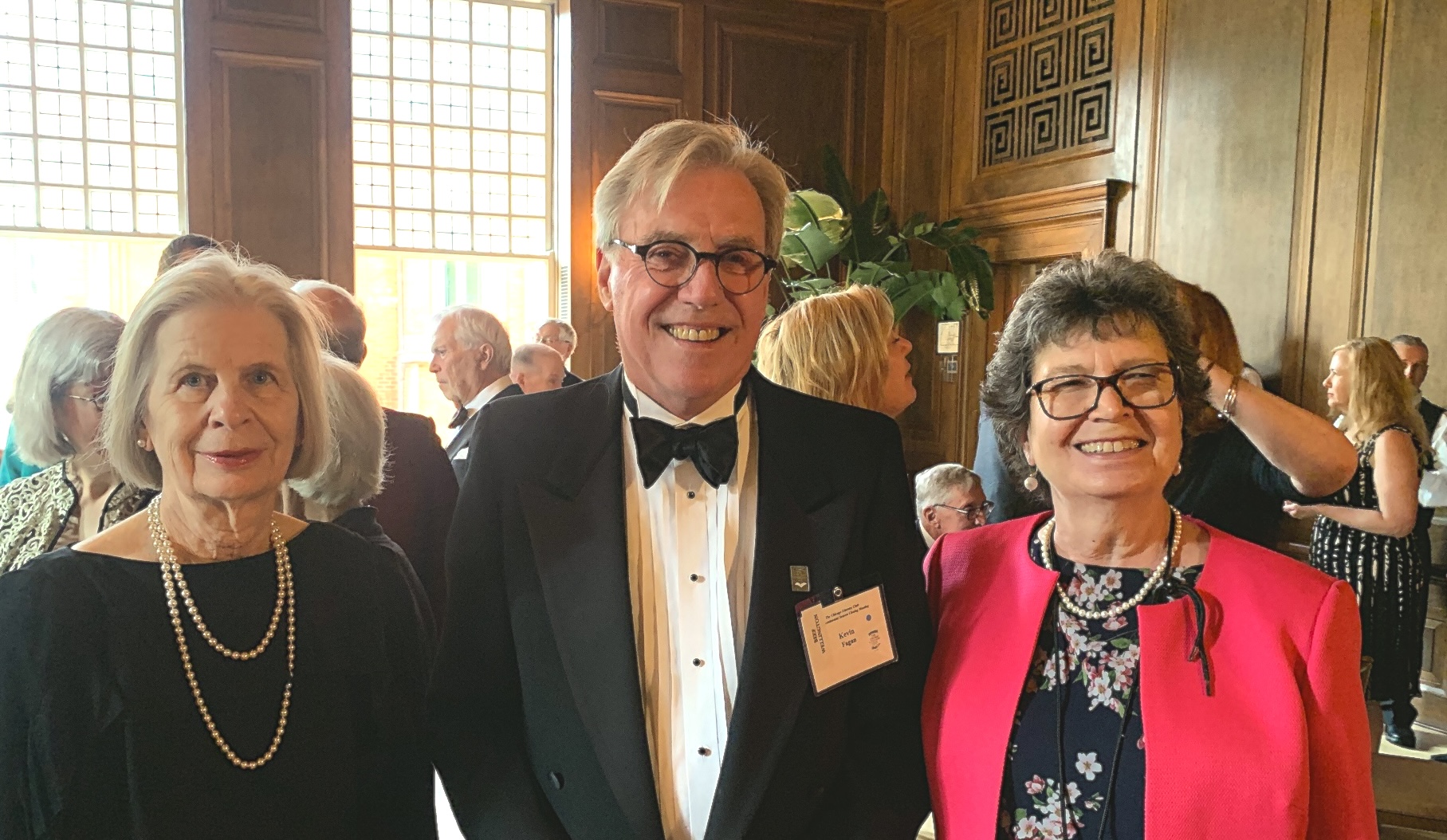
arolyn Short (left), CLC Scheme of Exercises Chairman Kevin Fagan and Lisa Prosnitz.Center
Members gather Monday nights at The Cliff Dwellers, across from and above the Art Institute and looking out over the yacht basin. After cocktails and dinner, papers cover a wide range of interests and experience: a recent college graduate trying a summer job doing seasonal salmon fishing work in Alaska (resulting in his decision to go to law school), or a personal memory of the 1968 Chicago DNC riots. Classic Chicago Magazine contributor Florri McMillan once presented a slide presentation on how women lawyers were treated by Hollywood. CLC President Robert Jordan read a paper about pickpockets and their evolution in skill. Had any of the members been pickpocketed? Half the members in the room raised their hands.
True, the club focuses on content first and ‘literary’ in its title has become a bit less a priority. As a judge in the room once said, ‘Lawyers can write too.” The club aims to explore individual curiosities. A quote from Brian Jack’s paper on the life of Robert Service may sum up its ‘literary’ ethic:
I have no doubt at all the Devil grins
As seas of ink I splatter.
Ye gods, forgive my ‘literary’ sins—
The other kind don’t matter.
H.L. Menken once called Chicago the literary capital of the nation. But what makes something ‘literary’ anyway? Richard Wright, on entering Chicago about 1920, said, “each person seemed to regard the other as part of the landscape.” Think then of Wright, and his fellow novelists and poets—Nelson Algren, Sinclair Lewis, Carl Sandberg, Saul Bellow, Gwendolyn Brooks, Sandra Cisneros—who painted a personal Chicago. In its own way, the Chicago Literary Club continues to explore its world and make it understandable.
Monday nights are simply fun. Members break bread at a long table, and the best part of each after-cocktails dinner finds a person seated beside … who knows? Heady, the conversations of curious people: what does one think about the new symphony conductor, the U.S. Supreme Court, Cormack McCarthy as prophet, the Civil War, or whether Rihanna can carry a tune.
As the club begins its next 150 years of sharing ideas, stay tuned.
Celebration Photos by Bill Parke.


